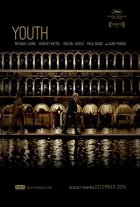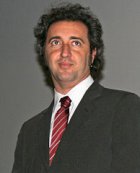
Youth Page #6
MICK BOYLE:
Unfortunately, yes. I swear.
FRED BALLINGER:
Well then, that changes things.
MICK BOYLE:
How?
FRED BALLINGER:
If you were sure you’d slept with
her, our friendship would be over
right this second. But if you’re
not sure, well, let’s just say...
that I can live with the
uncertainty.
MICK BOYLE:
Anyway, if I did go to bed with her
and don’t remember it, that means
she wasn’t worth twenty years of
your life, wouldn’t you say?
FRED BALLINGER:
Well yes, I guess you’re right. So
between us.
MICK BOYLE:
Good. Have the kids left?
FRED BALLINGER:
Your son wanted to do it up instyle: Polynesia.
MICK BOYLE:
I know, he’s a real spendthrift,
that one. Who knows where he gets
it from.
FRED BALLINGER:
Not from you, obviously.
Mick laughs. Silence. All of a sudden, Fred seems anxious. He
sighs. Mick notices.
25.
MICK BOYLE:
What? Are you still thinking about
Gilda Black?
FRED BALLINGER:
No. I’m thinking about the things
you forget over time. I don’t
remember my parents any more. What
they looked like, how they talked.
Last night I was watching Lena as
she slept and I started thinking
about all those little things,
thousands of them, that I did for
her as her father. I did them
deliberately, so that she would
remember them when she grew up. But
in time she won’t remember a single
one.
Mick looks at him but doesn’t know what to say. It’s a
beautiful moment.
Fred meets Mick’s gaze and, with a quickness and vigor that
is unusual for him, he grabs his friend’s arm and hisses
angrily.
FRED BALLINGER (CONT’D)
Tremendous efforts, Mick.
Tremendous efforts, and all for the
most modest results. That’s the way
it always is.
Mick is surprised, stunned even.
MICK BOYLE:
This conversation’s getting
interesting. I need a cigarette. I
left mine in the hotel, though.
Wait here, I’m going to go buy
another pack.
Fred nods sadly, as if defeated.
Mick heads off toward the village.
The silence is broken by a cicada singing. Fred turns toward
the sound and, as if in a trance, heads toward it.
CUT TO:
12A. EXT. WOODS. DAY
Fred is in the middle of the woods, where hundreds of cicadas
are singing. Then a strange bird chimes in, making an odd
sound, a sordid chirping that can be heard above the cicadas.
Fred forgets about the cicadas and heads off in search of the
bird, drawn to this new noise.
26.
He stares up at the trees, hoping to see the mysterious bird.
He crosses the woods, is almost at the other side, when a new
constellation of sounds is added to the others: cowbells.
Fred comes out of the woods and is greeted by a sunny, gently
rolling hill. Scattered across it are fifty or so grazing
cows, randomly ringing their bells. Fred’s eyes light up at
the sight. He sits on a rock and stares.
He listens to this superimposition of sounds: cows, bird,
cicadas.
Fred closes his eyes, concentrating now, as the camera slowly
zooms in on him.
Fred begins to move his hand - gently, gracefully, just like
an orchestra director - and, as if by magic, some of the
cowbells fall silent. Others keep ringing, but no longer in
anarchic fashion. Now they play in some clearly melodic
manner. Fred moves his hand again and silences more bells, so
that only two keep ringing, sounding alternate notes. Next
Fred waves his arm behind him, and the bird comes in. Then he
sweeps both arms wide, inviting the chorus to join in:
hundreds of cicadas accompany the bird solo and the cowbell
countermelody. A symphony of nature. Fred’s eyes are still
closed, he is smiling to himself.
The camera has zoomed in to a close-up of Fred’s face. For
the first time, he looks happy.
Mentally selecting the sounds nature offers him, he is doing
something amazing. He is composing.
CUT TO:
12B. EXT. MEADOW. DAY
Mick returns to the spot where he left Fred. He looks around,
but there’s no sign of him. He lights a cigarette.
As he does so, his eye catches something moving behind a
fence in the distance. A white horse.
So Mick does the only thing he knows how to do: he makes a
frame with his hands, the way directors do, to simulate the
viewfinder of a movie camera. He closes one eye and with the
frame of his hands he follows, in a panoramic shot, the
movement of the beautiful white horse.
13. INT./EXT. HOTEL. DAY
A pedestrian bridge leads from the back of the hotel to the
mountains. About a dozen staff - waiters, cooks, and nurses have
congregated here, enjoying their break.
27.
They’re all smoking, chatting, horsing around; this is their
time to relax. All except for one girl, who keeps to herself.
She smokes too, but doesn’t talk to anyone. She seems
melancholy. She is leaning over the railing, staring down
below, but without really seeing anything. It’s the masseuse
we saw in Fred's room.
Fred is a hotel hallway, standing at a window that looks out
onto the bridge. His face too is veiled in melancholy as he
stares at the lonely masseuse who smokes and stares.
The sound of that violin, still practicing that same
exercise, catches Fred’s attention. Off he goes, searching
for the source.
14. INT. HOTEL HALLWAY / ROOM. DAY
Fred moves cautiously down the deserted hallway. The violin
can be heard more clearly now. He runs into the sixty-yearold
doctor with the kindly face, followed by two nurses. Fred
and the doctor nod in greeting.
Fred comes upon a room, the door open. The chambermaid is
just finishing tidying up, and at the far end, standing in
front of a mirror with a musical score open in front of him,
a twelve-year-old boy is practicing those same two notes,
over and over and over.
The chambermaid leaves, pushing her cleaning cart through the
door.
Fred instinctively steps into the room. He watches the boy
play. The child senses someone’s presence and turns to look
at Fred.
Fred smiles at him. The boy smiles back.
Fred is a little worked up.
FRED BALLINGER:
Do you know who composed the piece
you’re practicing?
BOY:
No, who?
FRED BALLINGER:
Me.
BOY:
I don’t believe you. What’s it
called?
FRED BALLINGER:
It’s called “Simple Song No.3.”
The boy checks the title on the cover of his score.
28.
BOY:
You’re right. And what’s the
composer’s name?
FRED BALLINGER:
Fred Ballinger.
BOY:
And you, what’s your name?
FRED BALLINGER:
Fred Ballinger. You can check at
the front desk. I’m staying here.
The boy is surprised now.
BOY:
Incredible.
FRED BALLINGER:
Yeah, it is incredible.
BOY:
My teacher makes me play it, he
says it’s a perfect piece to start
with.
FRED BALLINGER:
He’s right. Because it’s simple.
BOY:
But it’s not merely simple.
FRED BALLINGER:
It’s not?
BOY:
No, it’s also really beautiful.
Fred, cold and impassive, instinctively lets something "hot"
slip.
FRED BALLINGER:
Yes, it is beautiful. Because I
composed it when I still loved.
The boy seems not to understand what Fred means, so simply
starts practicing again.
Translation
Translate and read this script in other languages:
Select another language:
- - Select -
- 简体中文 (Chinese - Simplified)
- 繁體中文 (Chinese - Traditional)
- Español (Spanish)
- Esperanto (Esperanto)
- 日本語 (Japanese)
- Português (Portuguese)
- Deutsch (German)
- العربية (Arabic)
- Français (French)
- Русский (Russian)
- ಕನ್ನಡ (Kannada)
- 한국어 (Korean)
- עברית (Hebrew)
- Gaeilge (Irish)
- Українська (Ukrainian)
- اردو (Urdu)
- Magyar (Hungarian)
- मानक हिन्दी (Hindi)
- Indonesia (Indonesian)
- Italiano (Italian)
- தமிழ் (Tamil)
- Türkçe (Turkish)
- తెలుగు (Telugu)
- ภาษาไทย (Thai)
- Tiếng Việt (Vietnamese)
- Čeština (Czech)
- Polski (Polish)
- Bahasa Indonesia (Indonesian)
- Românește (Romanian)
- Nederlands (Dutch)
- Ελληνικά (Greek)
- Latinum (Latin)
- Svenska (Swedish)
- Dansk (Danish)
- Suomi (Finnish)
- فارسی (Persian)
- ייִדיש (Yiddish)
- հայերեն (Armenian)
- Norsk (Norwegian)
- English (English)
Citation
Use the citation below to add this screenplay to your bibliography:
Style:MLAChicagoAPA
"Youth" Scripts.com. STANDS4 LLC, 2025. Web. 4 Mar. 2025. <https://www.scripts.com/script/youth_572>.







Discuss this script with the community:
Report Comment
We're doing our best to make sure our content is useful, accurate and safe.
If by any chance you spot an inappropriate comment while navigating through our website please use this form to let us know, and we'll take care of it shortly.
Attachment
You need to be logged in to favorite.
Log In